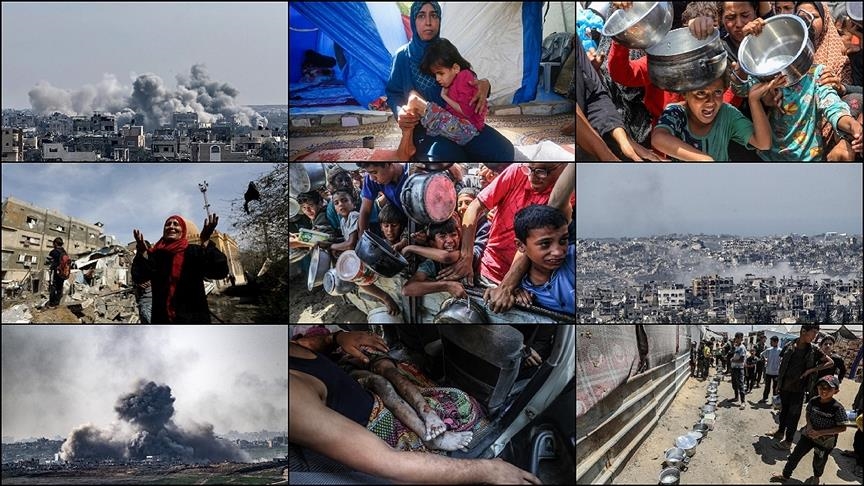Palestinians take deadly roads in search of food in Gaza Strip
‘Israeli boats are behind us in the sea, and the tanks are in front of us. Above us, Israeli planes are flying. We might be bombed any moment,” says Gazan passenger on Al-Rasheed coastal road

GAZA CITY, Palestine / ISTANBUL
Living under a tight Israeli blockade, Palestinian civilians in Gaza have to travel for miles every day to get something to eat and feed their children.
An Anadolu correspondent captured the daily struggle of Palestinian residents in northern Gaza to obtain food to feed their families and themselves.
They have to use carriages or tuk-tuks (3-wheel autorickshaws) during their challenging journey to get food after the Israeli army banned the movement of vehicles and trucks on the Al-Rasheed coastal road, the only available route from northern Gaza to the south after the closure of the Salah al-Din Street.
Every day, Majeed Dabbour, a tuk-tuk driver, spends two hours instead of 15 minutes to reach his relatives in the Nuseirat refugee camp in central Gaza to get flour.
“It is a trip full of dust and danger,” Dabbour told Anadolu. “Tuk-tuks have no chairs with a stifling fuel smell. We are living under extreme pressure,” he said.
The Palestinian resident said that the coastal road is the only route that remains open in Gaza.
“However, any car moving on the road is targeted by the Israeli army; that is why we are forced to use primitive vehicles,” he said.
“We have to take the risks to get the flour to feed our children, who have been facing starvation by the Israeli army for more than two months.” Since March 2, Israel has kept Gaza’s crossings closed to food, medical, and humanitarian aid, deepening an already humanitarian crisis, according to government, human rights, and international reports.
Last week, Jonathan Fowler, a spokesman of the UN agency for Palestinian refugees (UNRWA), told Anadolu that the humanitarian situation in Gaza has reached “the worst” level since the start of the Israeli onslaught in October 2023.
Nearly 2.4 million people in Gaza live completely dependent on humanitarian aid, according to World Bank data.
UNRWA spokesman Adnan Abu Hasna said Tuesday that hundreds of thousands of Palestinians eat only one meal every two or three days amid Israel’s crippling blockade.
“More than 66,000 children in Gaza are suffering from severe malnutrition,” he told Al-Ghad TV in an interview.
Figures released by Gaza’s government media office showed that at least 57 Palestinians have died of starvation since October 2023.
Starvation
Dabbour lamented that Gaza’s population is starving under Israel’s crippling siege.
“No humanitarian aid enters (Gaza), no food is available, people have no work or income, and there is nothing to eat in their homes,” he said.
“Even the flour in the north is spoiled and tainted and unfit for human consumption.”
Abdul Hamid, a Palestinian resident who did not give his second name, calls his daily trip in search of food “a risk fraught with danger.”
“We say the shahadas (Islamic prayer for declaration of faith) before we move, as the Israeli gunboats are behind us in the sea, the tanks in front of us, and warplanes are overhead. We might be bombed any moment,” he said.
He said the coastal road has become "the only dangerous road" after the Israeli army banned the movement of vehicles there.
“We seek help from God as we move,” he said.
Hard life
Umm Eyad Al-Lehaam, an elderly Palestinian woman, calls her first-time journey on the Al-Rasheed Road to Khan Younis in southern Gaza “exhausting and hard for elderly people.”
Ahmed Al-Banna, a tuk-tuk driver, agreed that the journey is “exhausting for both the driver and passengers.”
“We generally need to stop more than once for rest,” he told Anadolu. “Some passengers don’t speak out of extreme fatigue or fear. But there is no other choice; they want to reach their destination at any cost.”
Last week, the director of Gaza’s government media office, Ismail Thawabteh, told Anadolu that the enclave had entered “an advanced stage of famine” due to the continued closure of border crossings and Israel’s renewed military onslaught.
Over 52,500 Palestinians have been killed in Gaza in a brutal Israeli onslaught since October 2023, most of them women and children.
The International Criminal Court issued arrest warrants last November for Israeli Prime Minister Benjamin Netanyahu and his former Defense Minister Yoav Gallant for war crimes and crimes against humanity in Gaza.
Israel also faces a genocide case at the International Court of Justice for its war on the enclave.








